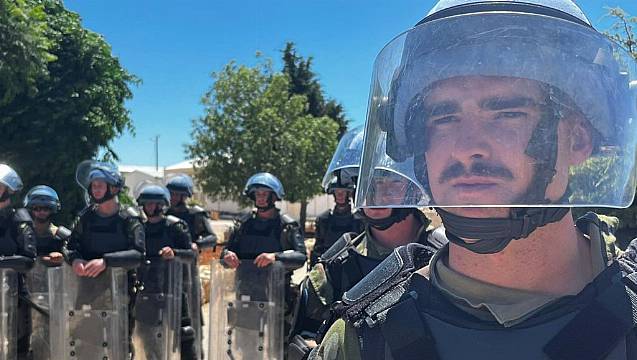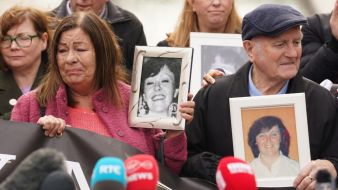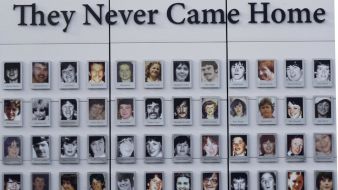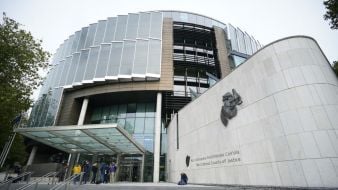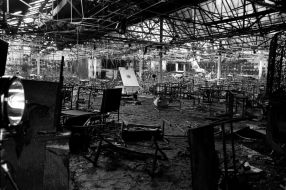Lieutenant David Kavanagh is on his first peacekeeping mission with the Defence Forces, following in his father's footsteps 44 years on.
Lt Kavanagh is one of the Irish soldiers serving in south Lebanon as part of Unifil (United Nations Interim Force in Lebanon).
Unifil is one of the largest peacekeeping forces in the world.
Lt Kavanagh conducts daily patrols on the Blue Line, stretching for 120km along Lebanon’s southern frontier.
The Blue Line is a key to peace in the region. It is not a border, but a "line of withdrawal". It was set by the United Nations in 2000 for the practical purpose of confirming the withdrawal of Israeli forces from the south of Lebanon.
Three months into his first overseas posting, Lt Kavanagh spoke to BreakingNews.ie about what life is like serving in southern Lebanon.
There are two camps where Irish soldiers are based in south Lebanon, the main camp, known as Camp Shamrock or 2-45, and 6-52, where Lt Kavanagh is stationed.
"We're approximately 500 metres from the Blue Line, so I can see into Israel from the post I’m on at the moment," he explained.
The Blue Line is patrolled 24 hours per day, so Lt Kavanagh's postings vary day-to-day, with patrols ranging from two to five hours.
"My daily life is very different to the daily life back in main camp, there’s only 30 of us out here. There’s myself, the platoon commander, the platoon sergeant, then there’s the 28 other lads. It’s only men here on the post at the moment.
"There’s 30 of us in total, because it’s such a small number it means our day-to-day is different to the lads back in main camp. Basically what happens is we’re patrolling base, that means we send out on average of four patrols a day that last anything between two and five hours. They vary between foot patrols and top patrols, which is going static in a high ground position and having a look, watching the Blue Line.
"A big thing we do is coordination with the Lebanese Armed Forces, the LAF, so it’s probably one of the most important patrols we do, through towns and around the Blue Line with the Lebanese Armed Forces."
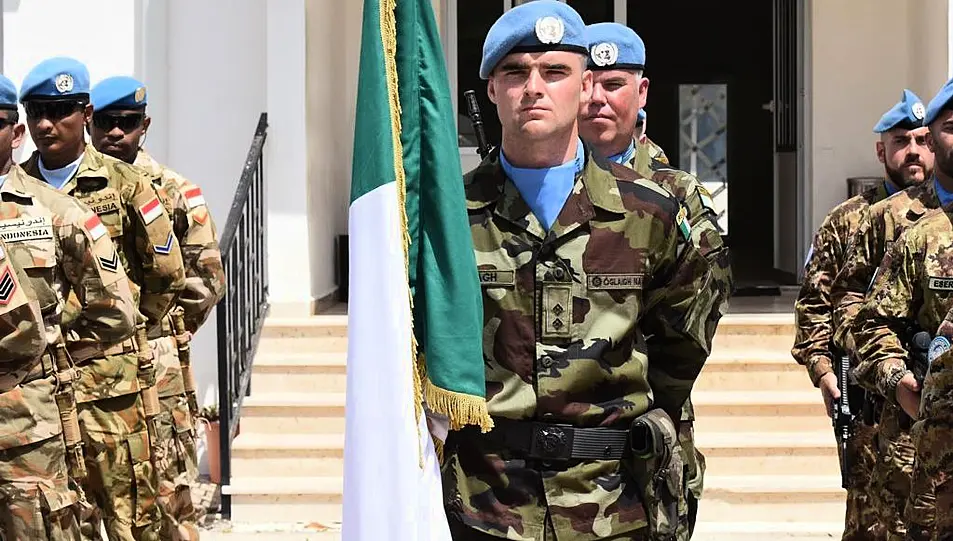
He added: "In terms of a daily routine, patrols are going out at all hours of the day, it changes based on the patrol metrics we’re given.
"For example, we’re doing nine hours of patrols today. It’s worked out in teams to try and spread the workload as evenly as possible, it means we are covering a 24-hour foot on the ground patrol of the Blue Line between ourselves and main camp."
While South Lebanon has been largely peaceful over the last few years, Lt Kavanagh explained that the professionalism of soldiers based there means they are always ready for potential danger.
"In 2018, everything was quiet in camp and then all of a sudden there was an exchange of artillery fire between the Israelis on one side of the border and other parties on this side of the border.
"Even though things do look calm and quiet, it can escalate very quickly."
At least 10 people were killed following Israeli air strikes on the Gaza Strip at the beginning of August, and Lt Kavanagh cited this as an example of a situation that put Unifil on high alert.
"There were rockets fired into the Gaza Strip, because of the proximity we have to Israel and because there are different factions around the place it means we were very aware we had to be ready for something to happen around here... so it went from your normal routine of sending out patrols and the day-to-day life in the camp to all of a sudden making sure you’re ready to go.
"You’re reminded very quickly of where you are, so it’s something that’s ever present. But it’s a testament to the professionalism of the people out here that there was no question, hesitancy, everyone was 100 per cent ready to go with the procedures we have."
Lt Kavanagh's father served in the first Irish Unifil contingent 44 years ago, and he is proud to be following in his footsteps.
"He was here in 1978/79. He’s delighted for me... it’s not something that I was always going to do. I grew up with loads of great and interesting stories about the Army and all the different things you could do... that he did.
"He never pushed me over to it, if he had tried to push me over to it, I would have said ‘absolutely not’. I got my degree first and then joined the Army, I wasn’t angling towards it, but I realised one day it was 100 per cent what I wanted to do, definitely the right decision.
"He subtly made the decision I think, I was like ‘it’s a great idea’, he was like ‘oh, is it?’"

While Lebanon was completely different when his father served there, Lt Kavanagh still valued the advice he gave him.
"It was a completely different landscape, when he was here first there was no Blue Line... the Israelis had freedom of movement in south Lebanon. The Irish troops were bedded-in at towns living in spare room of locals' houses. It would have been a far more kinetic environment than is the case now. He was here in 1985/86 when Lt Aengus Murphy was killed on that trip.
"It’s hard to juxtapose the mentality he would have had onto what’s happening here, it’s a completely different environment. He had some advice, which was great to get off him because he has a lot of experience, but it was a completely different environment.
"My father is like ‘yeah, brilliant’, because he loved his time overseas. My mother is a lot more worried, but he’s very quick to assure her that it’s a very different environment here now."
The Irish are like the wallpaper at this stage, we’ve been around here for so long.
Another important role of Unifil is to engage with locals, and Lt Kavanagh said they have a very positive relationship with the Irish soldiers stationed in south Lebanon.
"One of the types of the patrols we do is market walks, that’s specifically for us, we’re coordinated to go with the Lebanese Armed Forces, we go into local towns, and we spend a few Lebanese pounds... get a coffee, go to the markets, pick up a few things.
"The interactions you have with local people are good, Lebanese people are very friendly and welcoming. The Irish are like the wallpaper at this stage, we’ve been around here for so long.
"The locals definitely know the Irish soldiers well at this stage. There’s a shop just outside the main camp, Siopa Ali it’s called. Ali will be able to tell you more facts about Irish geography and Irish history than you know yourself. Ali knows well what the craic is.
"From my company’s perspective, that’s just one side of things, we’re the operational end of what the Irish do out here. There’s also a very hardworking civic set up, it’s basically civilian liaison work they do.
"Lebanon is in a social and economic crisis since the explosion happened in Beirut Port back in 2020, so what Unifil is also doing along with the patrols along the Blue Line, we also have an impact on the local population with quick impact projects such as investing in schools and helping with small projects that local leaders might need.
"Because of Covid everything receded a little bit, so we had to pull back in, we weren’t able to do nearly as much civilian interaction as we’d like to.
"One of the foundational columns of the work Unifil does out here is the liaison that you do with civilians, so obviously if that’s reduced it’s going to have a huge impact on your ability to get around the area, interact with locals, inform yourself as to what’s actually going on as opposed to what you see, the things we see.
"The locals know way more about what’s actually going on. It [Covid] definitely has had an impact."
Lt Kavanagh is well into the swing of things now after three and a half months in south Lebanon, and he said learning from Irish soldiers who have been there on a number of tours, along with work in places such as Syria and Mali, has been a big help.

The Defence Forces have a strong tradition of peacekeeping, and Lt Kavanagh said he knew it was something he wanted to do as soon as he made the decision to join the Army.
Irish soldiers working with Unifil serve alongside a number of different nationalities, with a large Polish contingent.
They also work with Maltese and Hungarian soldiers, along with the Lebanese Armed Forces (LAF).
Lt Kavanagh said forming good relationships is crucial as they all live and work together in small spaces. While the language barrier can sometimes pose problems, he said they always find a way to communicate.
"We have a few different contingents out here. We work with the Polish, they’re the other half of our battalion, so we have a great relationship, there are a lot of cultural and historical similarities there. We work with the Maltese, they’re embedded within the Irish contingent, I’ve got two Maltese soldiers on post with me here out of the 30, two great lads. We’ve also worked with Hungarians.
"I’ve a huge amount of respect for the LAF. They serve in the north and south of the country, in the north they have been fighting Isis for the last few years. Peacekeeping with us in the south and fighting them up north, so they have a huge amount of experience and are fighting in very difficult conditions.
"The language barrier is sometimes an issue, but they are a very professional organisation.
"A bit of French helps, the Maltese, some speak Arabic too. When you’re going to do a patrol, everyone understands the context of it and everyone knows where they’re going... so because you have that already the language barrier doesn’t have as much of an impact.
"There’s an understanding between Irish soldiers and the LAF because of the history we have here as well. It can sometimes be an issue, but we work through it very well.
"A couple of weeks ago myself and a few other soldiers went to a LAF camp further north and did a compare and contrast of counter-IED drills... so we were there sharing what we do, and they would say ‘when we were up north, this is what we did because we interacted in this way’.
"This isn’t a case study in a text book, actual IEDs (Improvised Explosive Devices) they had to work with, so it was definitely an eye-opener and an interesting, worthwhile exercise."
He added: "There’s not too many Blue Line violations at the moment, we’ve been lucky that way. We try to fill the evenings with keeping morale up.
"There’s a quiz every week, a few movies nights, and we have set up a volleyball net between two of the vehicles, so we play that every so often, it gets very competitive!
"The environment out here is hugely important because you’re confined in such a close space with other people it means you need to have a system in place that operationally works. That’s the bottom line, number two is to make sure people are getting their proper rest, meals and exercising as well, so there’s a small gym out here too, the lads are flat out there over the summer."
